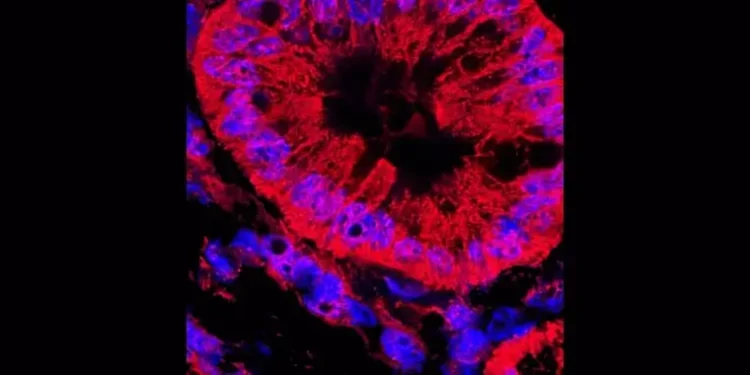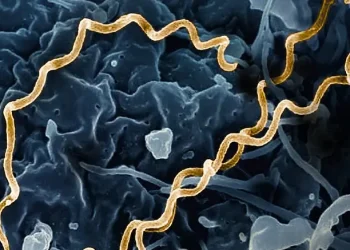Scientists have uncovered a promising new strategy for tackling one of the deadliest forms of cancer—pancreatic cancer—by disrupting how tumor cells metabolize fat.
The breakthrough could significantly improve survival outcomes, particularly when combined with existing therapies targeting well-known cancer-driving pathways.
Introduction
Researchers at the University of Michigan have found that blocking a specific enzyme involved in fat metabolism can suppress pancreatic cancer growth.
Published in Nature on April 23, 2025, the study outlines how PIKfyve inhibitors, combined with KRAS pathway drugs, may create a powerful dual therapy.
This discovery is vital due to pancreatic cancer’s poor prognosis and resistance to current treatments.
Understanding the Tumor’s Weak Spot
Pancreatic ductal adenocarcinoma—the most common pancreatic cancer—relies on the breakdown and recycling of cellular components via lysosomes.
Previous studies hinted that this recycling process fuels tumor survival. However, scientists had not pinpointed a druggable target until now.
The University of Michigan team focused on an enzyme called PIKfyve, essential for lysosomal function.
When they removed or inhibited this enzyme in genetically modified mice, tumor growth slowed dramatically without harming healthy pancreatic tissue.
Linking Fat Metabolism and Tumor Growth
Their research showed that PIKfyve plays a key role in managing how cancer cells process lipids. Inhibiting it disrupts fat metabolism, starving tumors of energy.
Experimental Inhibitors Show Promise
Two inhibitors—ESK981 and apilmod—were tested in mice. These drugs had already cleared phase 1 trials for other cancers. In the study, both compounds effectively reduced pancreatic tumor growth.
Further analysis of human pancreatic cancer cells revealed that blocking PIKfyve led to a metabolic shift.
Tumor cells, deprived of recycled lipids, turned to the KRAS–MAPK pathway to generate fat independently. This adaptability underscored the need for a combined approach.
Dual Pathway Impact on Tumor Suppression
| Therapeutic Target | Function in Tumor Cells | Result When Inhibited |
|---|---|---|
| PIKfyve Enzyme | Maintains lysosomal fat recycling | Reduces energy supply |
| KRAS–MAPK Pathway | Compensates by generating new lipids | Halts alternative energy path |
| Combined Inhibition | Disables both fat acquisition routes | Induces tumor regression |
Quick Highlights:
-
Inhibitors tested already passed safety trials.
-
Combination therapy may fast-track clinical application.
Why This Matters Now
Pancreatic cancer has a five-year survival rate of just 13%. It’s often diagnosed late and resists many forms of therapy. Identifying a treatment pathway that spares healthy cells while attacking tumors is rare—and promising.
This study not only exposes a vulnerability in pancreatic cancer metabolism but also uses existing drugs, speeding potential patient access.
Hope for Faster Clinical Impact
Because both PIKfyve inhibitors have been used in human trials, regulatory barriers are lower. Coupled with the availability of KRAS inhibitors for pancreatic cancer, this combination could move into advanced testing phases swiftly.
Moreover, by targeting metabolism, the therapy may help avoid the typical resistance tumors develop to single-drug treatments.
Effects on Further Cancer Research
The study underscores a growing trend in oncology: targeting metabolic dependencies. Many hard-to-treat cancers rely on specific energy sources. Understanding and disrupting these dependencies opens new therapeutic doors.
Researchers also noted potential applicability in other cancer types where lipid metabolism is critical.
Conclusion and Next Steps
This discovery marks a shift in pancreatic cancer research. By targeting fat metabolism through PIKfyve and combining it with KRAS inhibitors, scientists may soon offer a more effective therapy for one of the most lethal cancers.
Stay informed as clinical trials expand on this dual-target approach. For more on cancer research developments, visit cancer.gov.
Sources: National Institutes of Health, NY Post and University of Cincinnati Cancer Center.
Prepared by Ivan Alexander Golden, Founder of THX News™, an independent news organization delivering timely insights from global official sources. Combines AI-analyzed research with human-edited accuracy and context.









